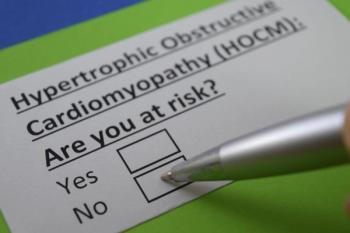
More Intensive Blood Pressure Management May Benefit Patients With Chronic Kidney Disease
New clinical practice guidelines call for lowering blood pressure levels down to 120 mmHg systolic for those with chronic kidney disease.
New, more intensive blood pressure lowering recommendations could benefit nearly 25 million Americans with chronic kidney disease (CKD) if followed, according to the results of a study published in Kidney International.
High blood pressure is a contributing factor to the development and progression of CKD and a major risk factor for cardiovascular disease. The guideline, which comes from Kidney Disease: Improving Global Outcomes (KDIGO), is intended for use in patients with CKD whose systolic blood pressure levels are over 120 mmHg.
KDIGO previously published recommendations on managing blood pressure in CKD in 2012. These guidelines called for the treatment of patients with CKD as needed to lower blood pressure to, or below, 140 mmHg systolic and 90 mmHg diastolic, and even lower for those with albuminuria. A joint recommendation released by the American College of Cardiology (ACC) and American Heart Association (AHA) in 2017 suggested blood-pressure lowering in patients with CKD to 130/80 mmHg.
According to analysis published in Kidney International, 69.5% of US patients with CKD, or approximately 24.5 million individuals, are eligible for blood pressure lowering according to the 2020 guidelines, compared with 49.8% according to the 2012 guidelines and 55.6% for the 2017 ACC/AHA guidelines. For the study, the investigators analyzed blood pressure and other data from a sample of 1699 US adults with CKD in the 2015-2018 National Health and Nutrition Examination Survey to gauge the proportion of those with CKD who would potentially benefit from the new guidelines.
Additionally, the investigators noted that the analysis suggests that, at the time of the survey, 14.4 million US adults with CKD were not taking blood pressure lowering medicines. Of these, 61.8%, or approximately 8.9 million US adults, had systolic blood pressure levels over 120 mmHg.
“Controlling blood pressure is particularly important for the 1 in 7 people in the United States with chronic kidney disease,” Josef Coresh, MD, PH, the George W. Comstock Professor in the Bloomberg School’s Department of Epidemiology, said in a statement. “Reducing blood pressure in adults with chronic kidney disease to the level recommended in the new guidelines could also reduce cardiovascular disease among this group.”
References
- New Blood Pressure-Lowering Guidelines Could Benefit 25 Million Americans with Chronic Kidney Disease. News release. Johns Hopkins Bloomberg School of Public Health. Accessed February 23, 2021.
https://www.jhsph.edu/news/news-releases/2021/new-blood-pressure-lowering-guidelines-could-benefit-25-million-americans-with-chronic-kidney-disease.html
Newsletter
Pharmacy practice is always changing. Stay ahead of the curve with the Drug Topics newsletter and get the latest drug information, industry trends, and patient care tips.























